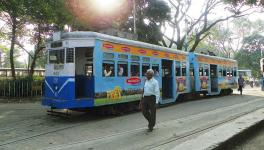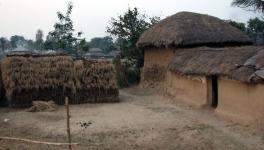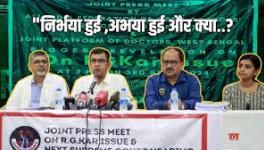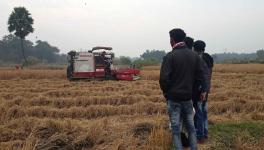Calcutta University’s Journalism Dept Observes 75 Years of Journey, Faces Challenges Ahead
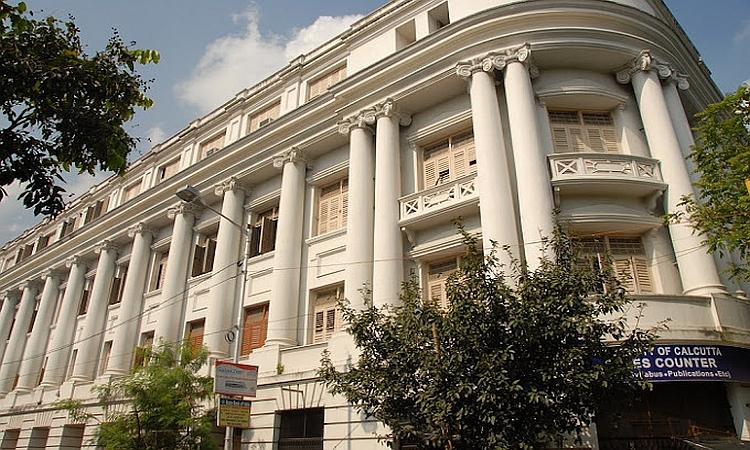
Calcutta University.
Kolkata: Marking a milestone in its journey, the 167-year-old Calcutta University’s department of journalism and mass communication completes 75 years this year. Set up in 1950, the department runs two courses – post-graduate and post-graduate diploma. NewsClick spoke with several persons, including faculty and students, of department, which is observing 75 years of its existence, its success stories as well as the challenges in its journey so far, and ahead.
“It would have been impossible for me to achieve quality education if Calcutta University and its journalism department with its nominal fee structure had not come to my aid. My father is an employee at the gram panchayat and his first priority was to marry off my elder sister. In such a constrained economic condition, had I not got this opportunity to pursue higher education in a reputed university, I would have been nowhere today,” Mizanur Rahaman, 27, from far-flung Malda district of West Bengal, told NewsClick. He completed his Master’s in journalism with ‘distinction’ from Calcutta University and cleared the UGC-NET-JRF exam (for higher studies) while he was in the final semester.
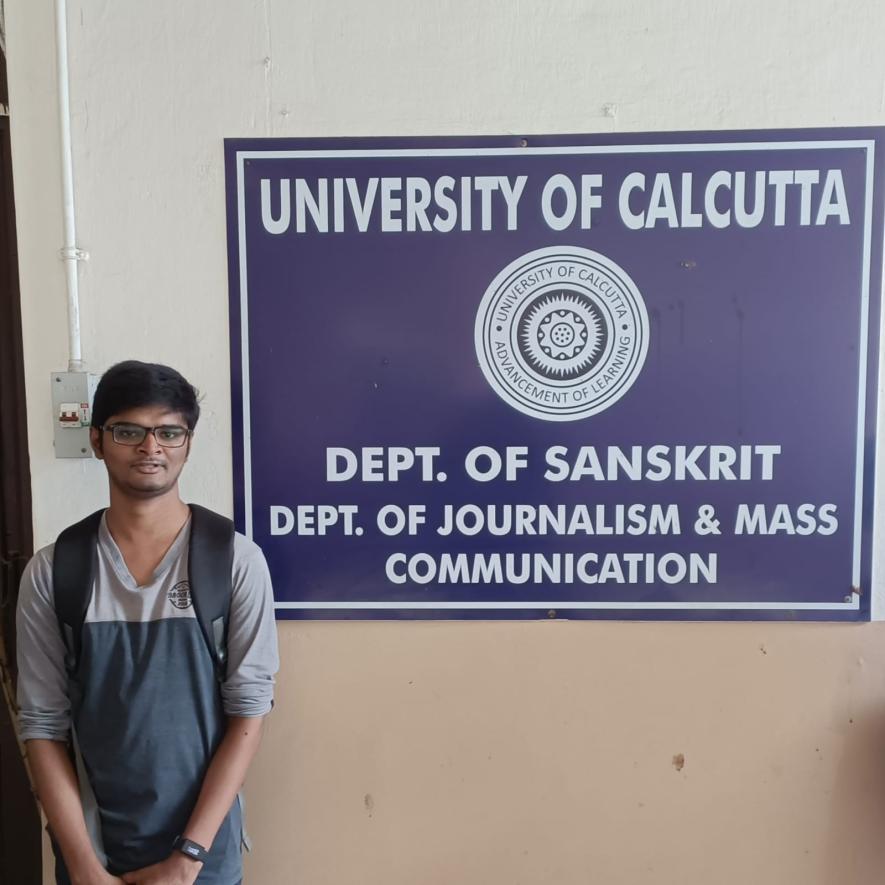
Mizanur Rahaman, 27, studying journalism in CU, belongs to far-flung Malda district of West Bengal, and is the son of a gram panchayat employee.
“The university not only has an easy fee structure, but also affordable mess service for residential students. The level of education is of high standard compared with many private universities of the country. The university also boasts a superior infrastructure,” said Saumendranath (Anjan) Bera , professor of journalism in the university and also the current Acting Dean, Faculty of Education, Journalism & Library Science.
“Calcutta University (CU) is public funded and has always promoted fair, ethical journalism, which is essential in the democratic set up of our country…. our pluralistic media system is antithetical and inclusive at the same time,” he added.
Bera pointed out that as a public funded university, CU was inclusive in nature and provided easy access to all category of students, even from lowest rung of the society.
“A dynamic subject like journalism has seen many changes in the past 75 years. Concepts like development journalism were unheard of earlier as also communication theories. Our journalism department boasts professional journalists as visiting faculty, which has helped in imparting cutting-edge education and technology to students," Bera added.
Pradipta Tapadar, chief reporter of news agency Press Trust of India in Kolkata and a student of CU’s 2013-15 batch, recalled that his days in the university were “mesmerizing”, especially the way professors like Bera or late Tapati Basu interacted with students.
“At present, there are so many journalism departments at the university level, but CU alumni are one of best in the country. The icing on the cake for the department will be to provide more practical training to students. Journalism is the “in” thing today and several under-graduate colleges and even schools have journalism courses in the state. Journalism is all about passion and CU has been able inculcate that in the mind of the students,” Tapadar told NewsClick, noting that journalism was becoming more challenging by the day.
He said the university should arrange for internship for all its students, adding that “for those who want to remain in academics, the department was doing very well, but for those who want to join the profession this suggestion (internships) should be kept in the mind .
PIjuskanti Panigrahi, head of the department concerned, said the department had started choice-based credit system for the first time in West Bengal in 2017. “The changes that we have able to bring have seen a lot of students cracking the UGC-NET exam or getting professionally absorbed. The CU top brass, such as the Vice Chancellor and Registrar take keen interest in running our department.”
Panigrahi added that the department was contemplating arranging for internships for students in future, adding that the requirement of trained manpower was increasing. He said now international students were also being enrolled in the department.
‘We have lot of wealth in the form of resources, like on eof the best libraries,” he added.
On the ceremony to observe 75 years of the department, Panigrahi said, “We have planned seminars where teachers and experts from all over the world will address our department. Drawing lessons from them, we plan to tread in the next five years to impart quality journalism education.”
However, Amal Sarkar, another ex-student of the department, who was a senior editor in the Times Group, and is currently visiting faculty, highlighted that the department was suffered due to lack of manpower.
“Once there was a ‘smart classroom’ which is now closed for an indefinite period. The university officials and government do not pay heed to repeated requests from students in this regard. In the past 25 years, there has been lack of regular teaching staff and whole course is being run by guest lecturers, whose pay package is only Rs 500 per class, whereas in private universities or other public universities, guest faculty is paid Rs 1,000-1,500 per class,” adding that the “honorarium, though not an essential thing for guest teachers, was a sign of recognition.”
Sarkar said the department was “trying its best but was not getting adequate help from the state government…. Such an international-level department should not be dealt with so abysmally. The lab-based practical part of the curriculum should have more opportunities.”
He alleged that “senior-most professor of university has to work like a clerical person”, adding the department “seems like in a mohalla (neighbourhood) full of senior citizens who nobody cares for, and when hits the century the clubs start felicitation events. This indicates the level of apathy and disrespect being shown to public education by the present state government,” Sarkar told Newsclick.
Debjyoti Chanda, a former student of the department and currently head of the department of journalism and videography of Rabindra Bharati University, said, “The department of journalism and mass communication (of CU) was one of the oldest departments of the country and in the state. It has produced many stalwarts. Once in the 1990s, there were three teachers, but now there is only one professor of journalism in the department.”
Chanda called for immediate filling up of vacancies in the teaching posts.
Snehashish Sur, a well-known journalist president of Press Club of Kolkata, has been associated with the department since his student days. Since 1992, he is also a visiting faculty of the department in CU, and completed his PhD from there. He said doyens have been part of the department since the foundation was laid by Bidhan Chandra Roy, former Chief Minister of West Bengal on October 7, 1950. Chapalakanta Bhattacharya, former Editor of Ananda Bazaar Patrika to Dakshinaranjan Basu are among many who taught in the university. Later Suniti Mukhopadhya of Amrita Bazaar Patrika to poet Krishna Dhar, Editor of Yugantar and Basumati paper also taught here.
As part of the 75th year ceremony on October 7, a walkathon will be organised that will start from the department premises in the College Street campus to Raja Subodh Mullick’s house (where revolutionary and sage Aurobindo used to live) in Wellington. A large number of alumni are expected to participate in the walkathon on Monday.
Get the latest reports & analysis with people's perspective on Protests, movements & deep analytical videos, discussions of the current affairs in your Telegram app. Subscribe to NewsClick's Telegram channel & get Real-Time updates on stories, as they get published on our website.











